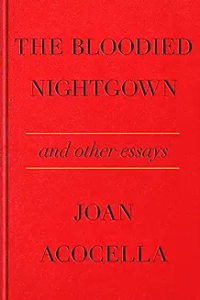The Bloodied Nightgown and Other Essays by Joan Acocella 2024
Acocella, the long time dance and literary critic for The New Yorker, dance critic for The Village Voice and The Financial Times, and frequent contributor to The New York Review of Books died on January 7, 2024 at the age of 78. In her New York Times review of Acocella’s best known book, “28 Artists and 2 Saints” published in 2007, Kathryn Harrison called Acocella “knowledgeable without being a show-off, meticulous in her research and energetically conversational”, and wrote that her “typical essay thus functions as a tantalizing biographical sketch, as well as a critical study, inviting us to pursue a deeper exploration”. This was certainly true in this book of 24 essays which originally appeared between 2007 and 2021 in The New Yorker or the NY Review of Books.
In delicious prose, often very funny and occasionally off color, Acocella uses her review of a newly published book as a jumping off point for a deep dive into an author’s oeuvre, a fascinating topic or usually both. I didn’t like the book’s title which was drawn from the first essay in the collection, a detailed review of Dracula and vampires in books, movies, and plays through the ages, but despite that, I found one treasure after another. Ranging from reviews of books about Kahlil Gibran’s “The Prophet” to Evelyn Waugh’s son’s book about his famous family of writers, from Agatha Christie to the Book of Job, from Louisa May Alcott’s “Little Women” to Elmore Leonard’s detective novels, Acocella brought a discerning eye, a sense of humor, and a fine style to each of these gems.
My favorite essay was the one about Edward Gorey, he of the famous drawing that introduced the PBS show Mystery! Gorey (b. 1925-d.2000) was a famous character who made it through Harvard, attended every performance of the New York City Ballet in adoration of Balanchine and his work, and designed the sets and costumes for the 1977 Broadway production of Dracula starring Frank Langella. Tall, completely bald with a large black beard, he sported at least a dozen fur coats some of them dyed with electric colors under which he wore turtlenecks and beads along with half a dozen rings on his fingers—quite the character.
In all of these essays, a fine sense of humor shows through. In her first paragraph in a review of a biography of Kahlil Gibran she wrote the following: “The Prophet has been recited at countless weddings and funerals. It is quoted in books and articles on training art teachers, determining criminal responsibility, and enduring ectopic pregnancy, sleep disorders, and the news that your son is gay.” Not bad for someone with a BA from Berkeley and a PhD in comparative literature from Rutgers.
If you, like I (? like me) love to read writing about writing, this is a book you will enjoy. Acocella’s death is a major loss for American criticism. Read her book as an homage and thank you for her contributions.



